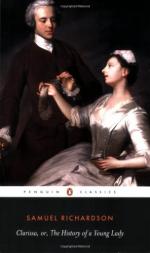* See Vol. VII. Letter XXVIII. ** Ibid. Letter XLVIII.
But, as Miss Howe treats her mother as freely as she does her lover; so does Mr. Lovelace take still greater liberties with Mr. Belford than he does with Mr. Hickman, with respect to his person, air, and address, as Mr. Belford himself hints to Mr. Hickman.* And yet is he not so readily believed to the discredit of Mr. Belford, by the ladies in general, as he is when he disparages Mr. Hickman. Whence can this particularity arise?
* See Letter XXXVI. of this volume.
Mr. Belford had been a rake: but was in a way of reformation.
Mr. Hickman had always been a good man.
And Lovelace confidently says, That the women love
a man whose regard for
them is founded
in the knowledge of them.*
* See Vol. V. Letter XVIII.
Nevertheless, it must be owned, that it was not purposed to draw Mr. Hickman, as the man of whom the ladies in general were likely to be very fond. Had it been so, goodness of heart, and gentleness of manners, great assiduity, and inviolable and modest love, would not of themselves have been supposed sufficient recommendations. He would not have been allowed the least share of preciseness or formality, although those defects might have been imputed to his reverence for the object of his passion; but in his character it was designed to show, that the same man could not be every thing; and to intimate to ladies, that in choosing companions for life, they should rather prefer the honest heart of a Hickman, which would be all their own, than to risk the chance of sharing, perhaps with scores, (and some of those probably the most profligate of the sex,) the volatile mischievous one of a Lovelace: in short, that they should choose, if they wished for durable happiness, for rectitude of mind, and not for speciousness of person or address; nor make a jest of a good man in favour of a bad one, who would make a jest of them and of their whole sex.
Two letters, however, by way of accommodation, are inserted in this edition, which perhaps will give Mr. Hickman’s character some heightening with such ladies as love spirit in a man; and had rather suffer by it, than not meet with it.—
Women, born to
be controul’d,
Stoop to the forward
and the bold,
Says Waller—and Lovelace too!
Some have wished that the story had been told in the usual narrative way of telling stories designed to amuse and divert, and not in letters written by the respective persons whose history is given in them. The author thinks he ought not to prescribe to the taste of others; but imagined himself at liberty to follow his own. He perhaps mistrusted his talents for the narrative kind of writing. He had the good fortune to succeed in the epistolary way once before. A story in which so many persons were concerned either principally or collaterally, and of characters and dispositions so various, carried on with tolerable connection and perspicuity, in a series of letters from different persons, without the aid of digressions and episodes foreign to the principal end and design, he thought had novelty to be pleaded for it; and that, in the present age, he supposed would not be a slight recommendation.




